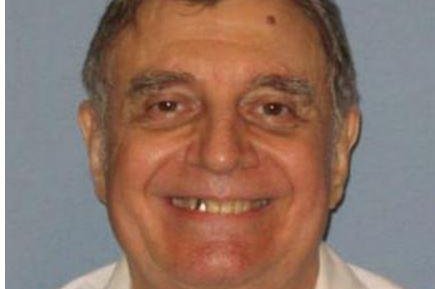The U.S. Supreme Court on Tuesday rejected an appeal from Tommy Arthur, who is on death row in Alabama for a 1982 murder. He claimed the state's lethal injection method of execution -- with the drug midazolam -- is unconstitutional. Photo by Alabama Department of Corrections.
Feb. 21 (UPI) -- The U.S. Supreme Court on Tuesday denied an appeal by an Alabama inmate on death row for more than 30 years over the use of lethal injection.
The shorthanded eight-member court denied the appeal by Tommy Arthur. Justices Sonia Sotomayor and Stephen Breyer dissented and said they would have heard Arthur's appeal.
The decision clears the way for Alabama to set a date to execute Arthur, who was convicted of the murder-for-hire killing in 1982 of Troy Wicker. He also was serving time for another death.
In November, the court blocked Arthur's execution while he waited in a holding cell outside the state's execution chamber. Chief Justice John Roberts was among five judges to halt the execution, but said Arthur's appeal "does not merit the court's review." Roberts said he provided the necessary vote to halt the execution as a "courtesy" to four colleagues who wanted to hear Arthur's appeal.
The court denied Arthur's argument that Alabama's use of the drug midazolam violates the Eighth Amendment that prisoners should be free from cruel and unusual punishment.
In December, an Alabama inmate, Ronald Bert Smith, injected with midazolam coughed and heaved for 13 minutes.
In an 18-page dissent, Sotomayor said the lower court ruling "permits states to immunize their methods of execution -- no matter how cruel or how unusual -- from judicial review."
She wrote: "Like a hangman's poorly tied noose or a malfunctioning electric chair, midazolam might render our latest method of execution too much for our conscience -- and the Constitution -- to bear."
In 2015, the Supreme Court by a 5-4 decision upheld the use of midazolam in 2015, saying inmates bore the burden of seeking a less risky known and available alternative for execution. Its ruling was based on the sedative used in Oklahoma's three-dug injection cocktail.
According to Arthur, the appeals court forced him to choose from two methods allowed by the state -- lethal injection and electrocution. Arthur contended that a firing squad would be less risky than lethal injection with midazolam.
In January, the U.S. Supreme Court denied Arthur's appeal on a state law that allows judges to override jury recommendations for life or death. Alabama is now the lone state that allows judicial overrides in death penalty cases although the legislature is considering a bill to change that.
Three different juries convicted him in 1983, 1987 and 1991.















